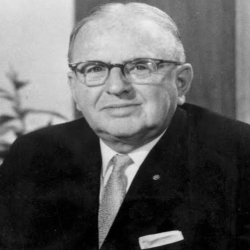
Norman Vincent Peale
American Clergyman and Author
| Date of Birth | : | 31 May, 1898 |
| Date of Death | : | 24 Dec, 1993 |
| Place of Birth | : | Bowersville, Ohio, United States |
| Profession | : | Author |
| Nationality | : | American |
Norman Vincent Peale was an American Protestant clergyman, and an author best known for popularizing the concept of positive thinking, especially through his best-selling book The Power of Positive Thinking.
Biography
Peale’s father was a Methodist preacher. The family moved frequently among various towns in Ohio as Peale was growing up, and he took after-school jobs to add to the family’s income. Following his graduation from Ohio Wesleyan University in 1920, he worked in journalism for a couple of years before deciding on a career as a minister. Peale was ordained in the Methodist Episcopal Church in 1922 and continued theological studies at Boston University, where he earned bachelor of sacred theology and master of arts in social ethics degrees in 1924. That year he was assigned to a small congregation in Brooklyn, NewYork, and, during his three-year tenure there, he built a new church and increased membership from 40 to 900. In 1927 Peale moved to the University Methodist Church in Syracuse, New York, where he again inspired a larger congregation and became one of the first clergymen to have his own radio program.
Five years later Peale changed his denominational affiliation to the Reformed Church in America in order to accept the pastorate at the Marble Collegiate Church in New York City. His dynamic sermons helped increase church membership from a few hundred to several thousand. To help with his parishioners’ many problems, Peale enlisted the aid of a psychiatrist and established a religio-psychiatric clinic; in 1951 that operation was organized as the nonprofit American Foundation of Religion and Psychiatry (now the Blanton-Peale Institute and Counseling Center), with Peale acting as president. In 1935 Peale began a weekly radio program, The Art of Living, which soon reached a national audience.
After World War II Peale founded and served as editor of a weekly four-page spiritual leaflet for businessmen called Guideposts, which by the 1950s had become a widely popular monthly magazine. Peale’s first book was The Art of Living (1937), and he also wrote You Can Win (1938) and A Guide for Confident Living (1948) before the appearance of The Power of Positive Thinking. Later volumes included Six Attitudes for Winners (1989) and This Incredible Century (1991). He retired as senior pastor in 1984.
Peale taught that religious faith could be tapped to improve one’s material life and that a positive mental attitude and belief in oneself are as necessary as belief in God. While his teaching gained him a large following, other Christian writers were more critical, pointing out that Peale’s philosophy neglected ideas of sin, suffering, and redemption. In addition, Peale was known for his support for conservative political causes. While the height of Peale’s popularity was in the 1950s, his message influenced such later evangelical Christian leaders as Robert Schuller, Joel Osteen, and T.D. Jakes. Peale won numerous honours, most notably the Presidential Medal of Freedom (1984).
Quotes
Total 50 Quotes
Yesterday ended last night. Every day is a new beginning. Learn the skill of forgetting. And move on.
Believe that you are bigger than your difficulties, for you are, indeed.
How you think about a problem is more important than the problem itself. So always think positively.
Empty pockets never held anyone back. Only empty heads and empty hearts can do that.
Our happiness depends on the habit of mind we cultivate.
When you affirm big, believe big and pray big, big things happen.
You are overcome by the fact because you think you are.
Never talk defeat. Use words like hope, belief, faith, victory.
Always remember, there is more strength in you than you ever realized or even imagined. Certainly nothing can keep you down if you are determined to get on top of things and stay there.
You have a choice everyday... You can choose every morning whether you will be depressed and miserable, or whether you will be happy.
